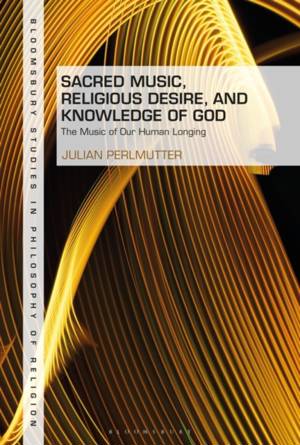
Bedankt voor het vertrouwen het afgelopen jaar! Om jou te bedanken bieden we GRATIS verzending (in België) aan op alles gedurende de hele maand januari.
- Afhalen na 1 uur in een winkel met voorraad
- In januari gratis thuislevering in België
- Ruim aanbod met 7 miljoen producten
Bedankt voor het vertrouwen het afgelopen jaar! Om jou te bedanken bieden we GRATIS verzending (in België) aan op alles gedurende de hele maand januari.
- Afhalen na 1 uur in een winkel met voorraad
- In januari gratis thuislevering in België
- Ruim aanbod met 7 miljoen producten
Zoeken
Sacred Music, Religious Desire and Knowledge of God
The Music of Our Human Longing
Julian Perlmutter
€ 228,95
+ 457 punten
Omschrijving
Many people find sacred choral music profound and deeply evocative, even in societies that seem to be turning away from religious belief. In this book, Julian Perlmutter examines how, in light of its wide appeal, sacred music can have religious significance for people regardless of their religious convictions.
By differentiating between doctrinal belief and the desire for God, the book explores a longing for the spiritual that is compatible with both belief and 'interested non-belief'. Perlmutter describes how sacred music can elicit this kind of longing, thereby helping the listener to grow in religious openness. The work of Thomas Merton is also analyzed in order to show that musically-elicited desire for God can be incorporated into the Christian practice of contemplative prayer, aimed ultimately at a union of love with God. By exploring connections between desire, knowledge, and religious practice, this engaging account illustrates how sacred music can have a transformative effect on one's wider spiritual life.
Of particular interest to philosophers and theologians, the book makes a novel contribution to several topics including religious epistemology, the philosophy of emotion, and aesthetics.
By differentiating between doctrinal belief and the desire for God, the book explores a longing for the spiritual that is compatible with both belief and 'interested non-belief'. Perlmutter describes how sacred music can elicit this kind of longing, thereby helping the listener to grow in religious openness. The work of Thomas Merton is also analyzed in order to show that musically-elicited desire for God can be incorporated into the Christian practice of contemplative prayer, aimed ultimately at a union of love with God. By exploring connections between desire, knowledge, and religious practice, this engaging account illustrates how sacred music can have a transformative effect on one's wider spiritual life.
Of particular interest to philosophers and theologians, the book makes a novel contribution to several topics including religious epistemology, the philosophy of emotion, and aesthetics.
Specificaties
Betrokkenen
- Auteur(s):
- Uitgeverij:
Inhoud
- Aantal bladzijden:
- 208
- Taal:
- Engels
- Reeks:
Eigenschappen
- Productcode (EAN):
- 9781350114968
- Verschijningsdatum:
- 20/02/2020
- Uitvoering:
- Hardcover
- Formaat:
- Genaaid
- Afmetingen:
- 156 mm x 234 mm
- Gewicht:
- 462 g

Alleen bij Standaard Boekhandel
+ 457 punten op je klantenkaart van Standaard Boekhandel
Beoordelingen
We publiceren alleen reviews die voldoen aan de voorwaarden voor reviews. Bekijk onze voorwaarden voor reviews.









